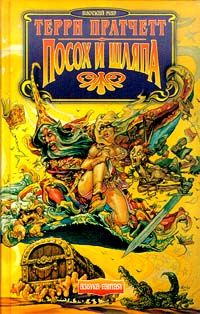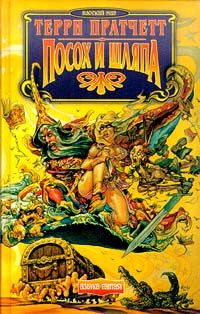Terry Pratchett - I Shall Wear Midnight
Behind the still shadowy figure, candles were lighting themselves, and now they illuminated someone in heavy, stiff clothing, big boots and a steel helmet on her head – although, as Tiffany watched, the figure carefully lifted the helmet off. She shook out her ponytail, which suggested that she was young, but her hair was white, suggesting that she was old. She was, Tiffany thought, one of those people who picks for themselves a look that suits them and doesn’t get in the way, and never changes it until they die. There were wrinkles too, and Tiffany’s guide had the preoccupied air of somebody who is trying to think of several things at once; and by the look on her face she was trying to think of everything. There was a small table in the room, set with a teapot, cups and a pile of small cupcakes.
‘Do come on in,’ said the woman. ‘Welcome. But where are my manners? My name is Miss … Smith, for the moment. I believe Mrs Proust may have mentioned me? And you are in the Unreal Estate, quite possibly the most unstable place in the world. Would you like some tea?’
Things tend to look better when the world has stopped spinning and you have a warm drink in front of you, even if it’s standing on an old packing case.
‘I’m sorry it’s not a palace,’ said Miss Smith. ‘I never stay here for more than a few days at a time, but I do need to be close to the University, and to have absolute privacy. This was a little cottage outside the University walls, you see, and the wizards just used to chuck all their waste over: after a while, all the different bits of magical rubbish started to react with one another in what I can only call unpredictable ways. Well, what with talking rats, and people’s eyebrows growing up to six feet long, and shoes walking around by themselves, the people that lived nearby ran away, and so did their shoes. And since there was no one complaining any more, the University simply chucked even more stuff over the wall. Wizards are like cats going to the toilet in that respect; once you’ve walked away from it, it isn’t there any more.
‘Of course, it then became a free-for-all, with just about anybody throwing over just about anything and running away very quickly, often pursued by shoes, but not always successfully. Would you like a cupcake? And don’t worry, I bought them off quite a reliable baker tomorrow, so I know they’re fresh, and I pretty much tamed the magic around here a year ago. It wasn’t too hard; magic is largely a matter of balance, but of course you’d know that. Anyway, the upshot is that there is such a magical fog over this place that I doubt if even a god could see into it.’ Miss Smith delicately ate half a cup-cake, and balanced the other half on her saucer. She leaned closer to Tiffany. ‘How did it feel, Miss Tiffany Aching, when you kissed the winter?’
Tiffany stared at her for a moment. ‘Look, it was just a peck, OK? Certainly no tongues!’ Then she said, ‘You are the person that Mrs Proust said was going to find me, aren’t you?’
‘Yes,’ said Miss Smith. ‘I would hope that is obvious. I could give you a long, complicated lecture,’ she continued brusquely, ‘but I think it would be better if I told you a story. I know you have been taught by Granny Weatherwax, and she will tell you that the world is made up of stories. I had better admit that this one is one of the nasty ones.’
‘I am a witch, you know,’ said Tiffany. ‘I have seen nasty things.’
‘So you may think,’ said Miss Smith. ‘But for now I want you to picture a scene, more than a thousand years ago, and imagine a man, still quite young, and he is a witchfinder and a book-burner and a torturer, because people older than him who are far more vile than him have told him that this is what the Great God Om wants him to be. And on this day he has found a woman who is a witch, and she is beautiful, astonishingly beautiful, which is rather unusual among witches, at least in those days—’
‘He falls in love with her, doesn’t he?’ Tiffany interrupted.
‘Of course,’ said Miss Smith. ‘Boy meets girl, one of the greatest engines of narrative causality in the multiverse, or as some people might put it, “It had to happen.” I would like to continue this discourse without interruptions, if you don’t mind?’
‘But he is going to have to kill her, isn’t he?’
Miss Smith sighed. ‘Since you ask, not necessarily. He thinks that if he rescues her and they can get to the river, then they might have a chance. He is bewildered and confused. He has never had feelings like this before. For the first time in his life, he is really having to think for himself. There are horses not far away. There are a few guards, and some other prisoners, and the air is full of smoke because there is a pile of burning books, which is making people’s eyes water.’
Tiffany leaned forward in her seat, listening to the clues, trying to work out the ending in advance.
‘There are some apprentices that he is training, and also some very senior members of the Omnian church who have come to watch and bless the proceedings. And finally there are a number of people from the nearby village who are cheering very loudly because it is not them who are going to be killed and generally they don’t get much entertainment. In fact, it’s pretty much another day at the office, except that the girl being tied to the stake by the apprentices has caught his eye and is now watching him very carefully, not saying a word, not even screaming a word, not yet.’
‘Does he have a sword?’ asked Tiffany.
‘Yes, he does. May I continue? Good. Now, he walks towards her. She is staring at him, not shouting, just watching, and he is thinking … what is he thinking? He is thinking, “Could I take on both of the guards? Will the apprentices obey me?” And then, as he gets nearer, he wonders if they could make it to the horses in all this smoke. And this is a moment eternally frozen in time. Huge events await his decision. One simple deed either way, and history will be different and you are thinking it depends on what he does next. But you see, what he is thinking doesn’t matter, because she knows who he is and what he has done, and the bad things that he has done and is famous for, and as he walks towards her, uncertain, she knows him for what he is, even if he wishes he wasn’t, and reaches with both hands smoothly through the wicker basket they’ve put around her to keep her upright, and grabs him, and holds him tight as the torch drops down onto the oily wood and the flames spring up. She never takes her eyes off him, and never loosens her grip … Would you like a fresh cup of tea?’
Tiffany blinked away smoke and flames and shock. ‘And how do you know so much about it, please?’ she said.
‘I was there.’
‘A thousand years ago?’
‘Yes.’
‘How did you get there?’
‘I walked,’ said Miss Smith. ‘But that is not the point. The point is that then was the death – and birth – of the thing we call the Cunning Man. And he was still a man, to begin with. He was terribly injured, of course. For quite some time. And witchfinding went on – oh my word, didn’t it just. You couldn’t tell who the other witchfinders feared most: the witches, or the wrath of the Cunning Man if they didn’t find him the witches he demanded and believe me, with the Cunning Man on your heels, you will find as many witches as he wants, oh yes.
‘And the Cunning Man himself could always find witches. It was quite amazing. You would have some quiet little village where everybody got on reasonably well and no one had noticed any witches at all. But when the Cunning Man arrived, suddenly there were witches everywhere, but unfortunately not for very long. He believed that witches were the reason for just about everything bad that happened, and that they stole babies and caused wives to run away from their husbands, and milk to go sour. I think my favourite one was that witches went to sea in eggshells in order to drown honest sailors.’ At this point Miss Smith held up a hand. ‘No, don’t say that it would be impossible for even a small witch to get inside an eggshell without crushing it, because that is what we in the craft would call a logical argument and therefore no one who wanted to believe that witches sank ships would pay any attention to it.
‘It couldn’t go on, of course. People can be very stupid, and people can be easily frightened, but sometimes you find people who aren’t that stupid and aren’t that fearful, and so the Cunning Man is thrust out of the world. Thrown out like the rubbish he is.
‘But that wasn’t the end of him. So great, so fearsome was his hatred for anything that he thought of as witchcraft that he somehow managed to live on despite finally having no body. Though there was no skin to him, no bone any more, his rage was such that he lived on. As a ghost, perhaps. And, every so often, finding someone who would let him in. There are plenty of people out there whose poisonous minds will open for him. And there are those who would rather be behind evil than in front of it, and one of them wrote for him the book known as The Bonfire of the Witches.
‘But when he takes over a body – and believe me, in the past, there are those unpleasant people who have thought that their terrible ambitions would be furthered by allowing him to do so – the owner of the body soon finds they have no control at all. They become a part of him too. And not until it is too late do they realize that there is no escape, no release. Except death …’
‘Poison goes where poison’s welcome,’ said Tiffany. ‘But it looks as though it can push its way in, welcome or not.’
‘I’m sorry,’ said Miss Smith, ‘but I will say “Well done.” You are as good as they say. There really is nothing physical now to the Cunning Man. Nothing you can see. Nothing you can possess. And while he often kills those who have been so generous in their hospitality, he nevertheless still appears to thrive. Without a body to call his own, he drifts on the wind and, I suppose, sleeps in some way. And if he does, I know what he dreams of. He dreams of a beautiful young witch, the most powerful of all the witches. And he thinks of her with such hatred that, according to elasticated string theory, it goes all the way round the universe and comes back from a different direction so that it seems to be a kind of love. And he wants to see her again. In which case, she will almost certainly die.
‘Some witches – real flesh and blood witches – have tried to fight him and have won. And sometimes they tried, and died. And then one day, a girl called Tiffany Aching, because of her disobedience, kissed the winter. Which, I have to say, no one has ever done before. And the Cunning Man woke up.’ Miss Smith put down her cup. ‘As a witch, you know you must have no fear?’
Tiffany nodded.
‘Well, Tiffany, you must make a place for fear, fear under control. We think that the head is important, that the brain sits like a monarch on the throne of the body. But the body is powerful too, and the brain cannot survive without it. If the Cunning Man takes over your body, I don’t think you would be able to fight him. He would be like nothing you have met before. To be caught will be, ultimately, to die. What is worse, to be his creature. In which case, death will be a longed-for release. And there you have it, Miss Tiffany Aching. He wakes up, he drifts, he looks for her. He looks for you.’
‘Well, at least we’ve found her,’ said Rob Anybody. ‘She’s somewhere in that festering midden.’
The Feegles stood with their mouths open in front of the bubbling, suppurating mess of the Unreal Estate. Mysterious things plopped, spun and exploded under the debris.
‘It will be certain death to go in there,’ said Wee Mad Arthur. ‘Certain death! You’ll be doomed.’
‘Oh aye, we’re all doomed sooner or later,’ said Rob Anybody jovially. He sniffed. ‘What the heel is that stink?’
‘Sorry, Rob, that was me,’ said Daft Wullie.
‘Ach no, I ken your smell,’ Rob said. ‘But I ken I smelled it before. It was that walking gawky that we smelled on the road. Ye ken? All in black. Very lacking in the eyeball department. Bad cess to him, and bad cess he smelled. And I recollect he used very bad words about oor big wee hag. My Jeannie said we must stay close to the big wee hag and I reckon this scunner needs a bath.’
Wee Mad Arthur precipitated matters. ‘Weel, Rob, ye going in there is against the law, ye ken?’ He pointed to an ancient and half-melted sign on which, just readable, were the words: ACCESS STRICTLY FORBIDDEN. BY ORDER.
Rob Anybody stared at it. ‘Ach, now you give me nae choice at all,’ he said, ‘and you made me remember that we’re all dead already.20 Charge!’
There were dozens of questions that Tiffany could ask but the one struggling to the top was: ‘What will happen if the Cunning Man catches up with me?’
Miss Smith stared at the ceiling for a moment. ‘Well, I suppose from his point of view, it will be rather like a wedding. From your point of view, it will be exactly like being dead. No, worse, because you will be inside, looking out at what he can do with all your powers and all your skills to all the people that you know. Did we have the last cupcake?’
I’m not going to show any fear, said Tiffany to herself.
‘I’m glad to hear that,’ said Miss Smith out loud.
Tiffany leaped off the chair in a rage. ‘Don’t you dare do that, Miss Smith!’
‘I’m sure there was one more cupcake,’ said Miss Smith, and then added, ‘That’s the spirit, Miss Tiffany Aching.’
‘You know, I did defeat a hiver. I can look after myself.’
‘And your family? And everybody you know? From an attack that they won’t even know is happening? You don’t understand. The Cunning Man isn’t a man, although he was once, and now he’s not even a ghost. He is an idea. Unfortunately he is an idea whose time has come.’
‘Well, at least I know when he’s near me,’ Tiffany said thoughtfully. ‘There’s a dreadful stink. Even worse than the Feegles.’
Miss Smith nodded. ‘Yes, it’s coming from his mind. It’s the smell of corruption – corruption of thinking and of action. Your mind picks it up and doesn’t know what to do with it, so it files it under “stink”. All the magically inclined can smell it; but when people encounter it, it changes them, makes them a little bit like him. And so trouble follows wherever he goes.’
And Tiffany knew exactly what kind of trouble she meant, even though her memories shot her back in time to before the Cunning Man had woken again.
In her mind’s eye she could see the black-edged pieces blowing back and forth in the late-autumn wind, which sighed with despair in her mind’s ear, and worst of all, oh yes, worst of all, her mind’s nose snuffed up the sharp acrid stink of ancient, half-burned paper. In her memory some of the pieces fluttered in the pitiless wind like moths that had been swatted and broken, but were still hopelessly trying to fly.
And there were stars on them.
People had marched to the rough music and roughly dragged out the cracked old woman whose only crime, as far as Tiffany could see, was that she had no teeth left and smelled of wee. They had thrown stones, they had smashed windows, they had killed the cat, and all this had been done by good people, nice people, people that she knew and met every day, and they had done all these things which, even now, they never talked about. It was a day that somehow had vanished from the calendar. And on that day, with a pocketful of charred stars, not knowing what it was she was doing, but determined to do it, she had become a witch.



